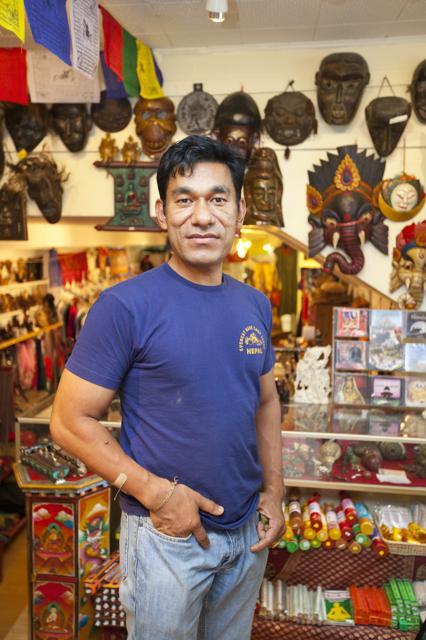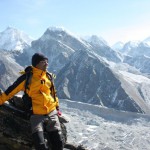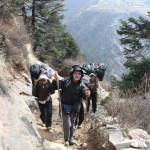- Local goes global: Asheville business owner Manoj Lama recently visited his native country of Nepal and trekked to the top of Gokyo Ri, a 17,575 foot Himalayan peak near Mount Everest. Check out the online version of this story for a narrated slide show of photos from the trip. Photo by Jonathan Welch
- Photos courtesy of Manoj Lama
When Manoj Lama traveled to Nepal in April on a buying trip for his downtown Asheville shop, he didn't expect to wind up atop Gokyo Ri, a 17,575-foot Himalayan peak. The owner of Himalayas Import and the Kathmandu Café was on his annual pilgrimage to visit family and take care of business when a group of friends persuaded him to join them on their trek. And though the journey was fraught with challenges, in the end, Lama says reaching that mountaintop on a clear day with Mount Everest looming above was one of the greatest experiences of his life.
Xpress sat down with Lama recently to hear his travel tales as well as his thoughts on living and owning businesses in Asheville. Here’s some of what he had to say.
Mountain Xpress: Did you have any trekking experience before this trip?
Manoj Lama: I didn't have any formal experience trekking or climbing or anything like that. But I was born in a village at about 2,300 meters [about 7,500 feet]. So you had to climb up and down every single day, just to go to school. But this trek was completely different.
What inspired you to do it?
When I was away from home, I always missed those mountains. Those mountains were my friend; I grew up with them. But I wasn't interested in climbing them before. One day I just decided to do it.
What were the most challenging parts of the trip?
I was a little nervous in the beginning, but my wife really encouraged me. The plane ride was really bumpy, and that scared me a lot. It goes through narrow mountains, and it's like a wind tunnel. It's a very small plane; some of my friends were sick.
It was also challenging trying to climb up to nearly 18,000 feet. … I wasn't well equipped for that kind of coldness; I thought it wouldn't be that cold in April. So the gear I was carrying wasn't warm enough for that altitude: My gloves and socks weren't warm enough. I had a climbing stick, but if I used it, my hands would get very cold. So I left that stick and put my hands in the jacket pockets. But when I put my hands in my jacket, I had too much pressure on my legs, so I started getting tired.
When I had climbed about one-third of the way, I got tired and cold and I kind of gave up. I told my friends, "You guys can climb up there, but I'm going down." When I was descending, I met a trekking guide from Nepal who was leading six German seniors. They were in their 60s, and the guy told me: "If you try, you can make it. If you slow the pace, it's easier to climb. He really encouraged me and even let me borrow his gloves. Then I started to climb up again, and finally I made it. And that was very satisfying.
Did the challenges make getting to the top more fulfilling?
I was glad the other guy encouraged me; otherwise it would have always been incomplete. I would have had to come back to do it, or I would have regretted it all my life. Because once you get up there, there's no words to express how beautiful it is and the way you feel. Ngozumpa, one of the biggest glaciers in Nepal, is near that mountain. You can hear it moving very slowly, making a cracking sound. That was amazing hearing that noise, breaking ice.
Were you in Nepal on business?
Yeah, I do all the buying for my shop. At the same time, all my family still lives in Nepal, so I go back and see them. I know a lot of people there, local artists. So rather than go to the market and find stuff, I'll meet them and place an order. Most of the things in Nepal are handmade; Americans are fascinated with that. Traditional Buddhist paintings, called tanka, take months and months to finish just one piece.
Why did you come to the U.S.?
I was in vocational school in Longmont, Colo., for computer accounting. But because of different circumstances, I couldn’t continue. Where I grew up, there's high traffic of American trekkers. So that made me fascinated with the U.S. … The trekkers helped me learn English; I didn't have any formal schooling or training in language.
What brought you to Asheville?
I came to visit Asheville in 2000, because we had a friend here we met in Nepal. We really liked Asheville: It has mountains, even though they're not as big as in Nepal. The weather is comfortable; the people are very nice.
I was trying to find a different place for an import shop that has the interest and less competition. When I came to Asheville, I thought, "Let's try it for a year." And I was happy with my business, and I was happy being here.
How did you come up with the idea to start the restaurant?
Most of the time I was in Colorado I was working in a restaurant: in the kitchen, on the floor, in management. I wanted to use my experience.
Have you found there's a niche for Nepalese and Indian food here?
Yeah, because Asheville is a very interesting town. People are always looking for something new — they're very open-minded.
How has the economy affected your businesses?
I started the restaurant in a tough time, but I'm still here. … So if the economy gets better, I think I'll do very good. But if it stays the same way, I won't stay in the business.
The shop, we have definitely noticed the difference from when I first started. People are trying to spend less money; they're only buying what they need or what they really want.
Did your trek make you want to climb Everest next time?
Actually, I talked to my wife about that. … I could see Mount Everest from where I was born. … If I get the proper training and I'm committed to do it, my inner inclination is telling me that I could climb Everest too. … I think that kind of altitude is in my blood, so now I'm very encouraged. Some day I may climb Everest.
A narrated slideshow:
Narration by Manoj Lama
Photos courtesy of Manoj Lama
Slideshow produced by Jake Frankel
— Jake Frankel can be reached at 251-1333, ext. 115, or at jfrankel@mountainx.com.









Before you comment
The comments section is here to provide a platform for civil dialogue on the issues we face together as a local community. Xpress is committed to offering this platform for all voices, but when the tone of the discussion gets nasty or strays off topic, we believe many people choose not to participate. Xpress editors are determined to moderate comments to ensure a constructive interchange is maintained. All comments judged not to be in keeping with the spirit of civil discourse will be removed and repeat violators will be banned. See here for our terms of service. Thank you for being part of this effort to promote respectful discussion.